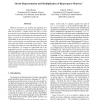Free Online Productivity Tools
i2Speak
i2Symbol
i2OCR
iTex2Img
iWeb2Print
iWeb2Shot
i2Type
iPdf2Split
iPdf2Merge
i2Bopomofo
i2Arabic
i2Style
i2Image
i2PDF
iLatex2Rtf
Sci2ools
110
click to vote
IPPS
2008
IEEE
2008
IEEE
On the representation and multiplication of hypersparse matrices
Multicore processors are marking the beginning of a new era of computing where massive parallelism is available and necessary. Slightly slower but easy to parallelize kernels are becoming more valuable than sequentially faster kernels that are unscalable when parallelized. In this paper, we focus on the multiplication of sparse matrices (SpGEMM). We first present the issues with existing sparse matrix representations and multiplication algorithms that make them unscalable to thousands of processors. Then, we develop and analyze two new algorithms that overcome these limitations. We consider our algorithms first as the sequential kernel of a scalable parallel sparse matrix multiplication algorithm and second as part of a polyalgorithm for SpGEMM that would execute different kernels depending on the sparsity of the input matrices. Such a sequential kernel requires a new data structure that exploits the hypersparsity of the individual submatrices owned by a single processor after the 2...
Distributed And Parallel Computing | IPPS 2008 | Multiplication Algorithm | Sparse Matrix | Sparse Matrix Representations |
Related Content
| Added | 31 May 2010 |
| Updated | 31 May 2010 |
| Type | Conference |
| Year | 2008 |
| Where | IPPS |
| Authors | Aydin Buluç, John R. Gilbert |
Comments (0)

